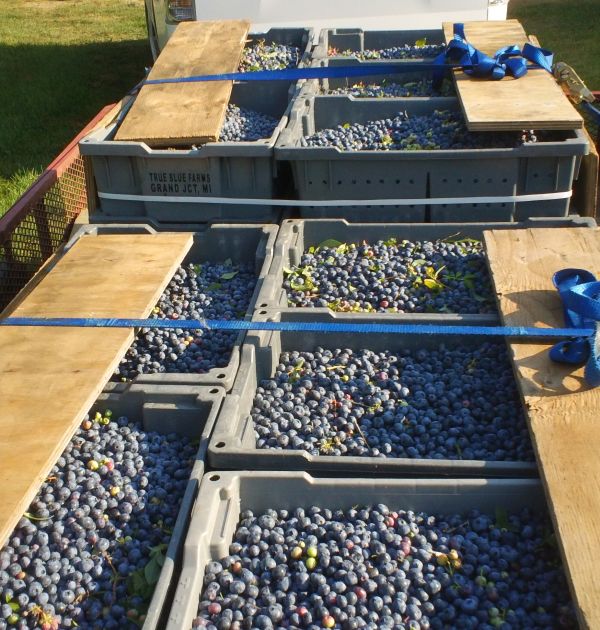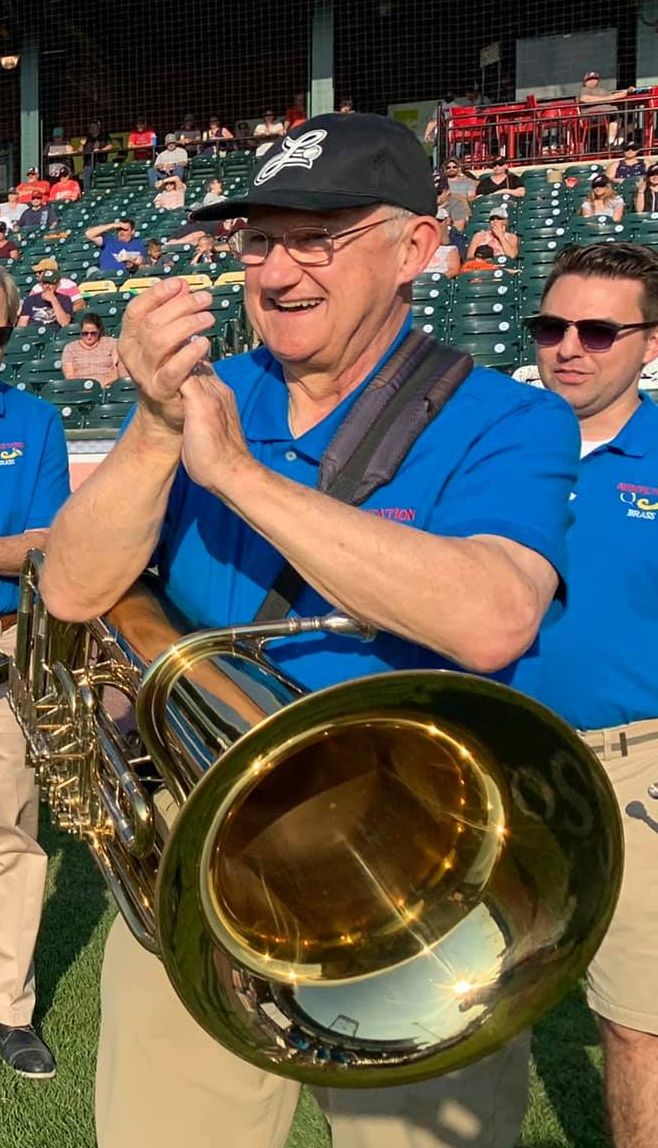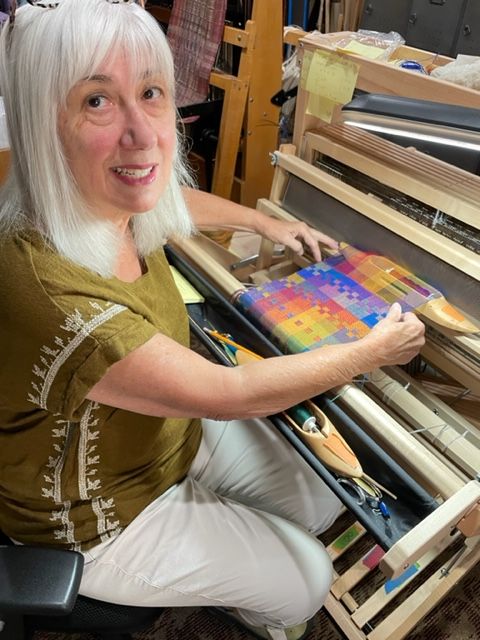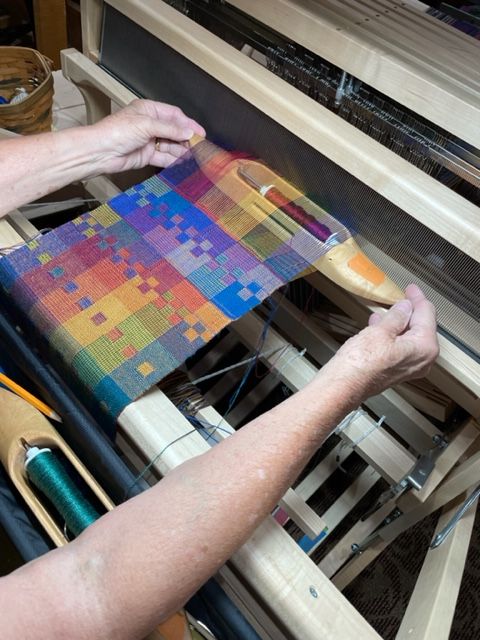Second Acts: Alumni Find New Passion and Purpose in Retirement
By Elisa Ludwig
A blueberry farmer, a weaver, a brass musician and a fundraising/event planning maven walk into a bar — or rather, a Drexel reunion. The College of Medicine has many distinguished alumni with wondrous career achievements, but these four onetime physicians demonstrate that retirement doesn’t have to signal the end of fulfilling work days, and that learning and growing are forever.
HARVESTING CONTENTMENT
Richard Coleman, MD, HU ’72

It’s blueberry season on Richard Coleman’s 11 acres in Glen, Michigan, a familiar site for the farmer/physician. Coleman grew up in the South Side of Chicago, spending summers and weekends at the country cottage his parents built on this very same land in 1942.
“It’s about a two-and-a-half-hour drive from where we lived, so I knew both the city and what it was like out here,” he says. “My mother was a botanist and my father was a chemist, and we worked together to grow fruit. In the 1950s and 1960s, we were growing peaches commercially, plus apples, pears and sour cherries.”
Like his parents, Coleman became a scientist, initially getting his BS in microbiology from University of Michigan and his MS in microbiology at the University of Arizona before he applied to medical school on something of a whim. That whim led him to Hahnemann and Philadelphia, which became the foundation for his medical career and lifelong conviction that he was happier outside of the city. After graduating in 1972, Coleman eagerly returned to his native Michigan. He settled in Kalamazoo, where, for his internship, he joined a group of doctors who were establishing the specialty of emergency medicine. He practiced as an emergency physician and family medicine specialist until 1998, at which point he was ready for more predictable hours than the ER could provide. He took a job at American Axle and Manufacturing, which makes all the driveline, powertrain and truck axles for General Motors, where he ran the internal clinic and oversaw the health care of the company’s workers.
All along Coleman had been coming back to his summer house and growing blueberries in his spare time, but in 2003, when he largely retired from medicine (he still helps out neighbors and friends when needed) he finally had the chance to dedicate more hours to his avocation. Indeed, he turned it into a business for many years.
“I’ve been growing about two and a half acres of blueberries. To put it into perspective, a regular blueberry farm is at least 50 acres around here,” he says. With the help of migrant pickers, and more recently a picking machine, he was able to harvest enough to sell his wares. “Theoretically, farming is a good way to spend your life. Farmers really like their lives because they’re their own boss. But it’s difficult to really make a living doing it.”
Technically, Coleman has now also retired from his retirement career, growing blueberries and apples for fun and enjoying a quiet life in a remote part of the country. “I’ve traveled all around the world and scuba-dived everywhere I went. These days, I don’t do anything unusual. I’m just a retired farmer who used to work in the ER.”
PLAYING BY EAR
Gerald Rothacker, MD, HU ’76

Gerald Rothacker learned to play music at an early age, inspired by his father, who was also a musician, and he pursued his passion through college. By the time Rothacker got to Hahnemann Medical College in 1972, however, he was married and had one son — a second was born during his first year in medical school. Between the commitments to his study and his growing family, he was too busy for music. Once the orthopedic surgeon completed his residency at the Mayo Clinic and started his practice at Orthopedic Associates of Lancaster, he was eager to get back to it.
As word got out in the hospital cafeteria, the multi-instrumentalist found that he was not the only doctor around Lancaster with musical talent. In 1985, several of his physician peers from a wide range of specialties got together and formed the Auscultation Brass Band, with Rothacker on trombone. Thirty-seven years later, Auscultation Brass Brand is still going, practicing once a week and performing brass quintet or sextet music almost monthly at local events and retirement homes, though he says members have come and gone over the years. Auscultation Brass sponsored a scholarship for a brass musician through the Pennsylvania Academy of Music and invites the recipient to join them in their performances.
Retired since 2016, Rothacker finally has all the time in the world for music, and he is currently a member of three other bands. When he’s not rehearsing or playing a gig, he takes part in medical mission work through his church, golfs and fishes with his grandsons. He has also been active as treasurer supporting the Lancaster Medical Heritage Museum. The museum, which recently moved into a new home in downtown Lancaster, has some 14,000 artifacts in its permanent collection and is open to the public.
Rothacker started out as a general orthopedist who later came to specialize in total joint replacements. He and his wife have also created the Carla A. and Gerald Rothacker Jr. MD ’76 Scholarship Fund at Drexel to support students with family responsibilities.
“When it was time to retire I wanted to give back. I had a very rewarding career with great patients — some of whom call me now to book our band,” he says. “I’m lucky that I have so many interests and I’ve been able to expand within them. Hardly have I had a day in retirement when I went to bed with the feeling that I’ve accomplished every single thing I wanted to do.”

A GARDEN OF JOY
Helen Horstmann, MD, WMC ’72
Even during the peak of her career as a surgeon and mother of six daughters, Helen Horstmann had always been active in giving back, whether as a leader of a professional organization, as a volunteer on boards, or with philanthropic contributions. She’d always held a special place in her heart for the Pennsylvania Horticultural Society (PHS) — so much so that she named one of her children after the organization’s then-leader. A passionate home gardener, she regularly attended the organization’s events and workshops.
Horstmann graduated in the last class of Woman’s Medical College in 1972 before completing her residency in orthopedics at Jefferson. As an orthopedic surgeon at Children’s Hospital of Philadelphia, she specialized in cerebral palsy.
She joined the PHS board in 2016, and when she retired from her practice in 2018, she had the opportunity to get more involved. Early on, she was drafted to chair a fundraising event. And within a short time after that she was chairing the Philadelphia Flower Show. PHS’s flagship event, the annual Flower Show attracts hundreds of thousands of visitors and is estimated to generate $60 million for the city every year. Horstmann still can’t believe her luck.
“I’d always been a groupie for PHS and now, here I am: the chair of the biggest event they have, overseeing 2,000 volunteers,” she says. Of course, her tenure overlapped with the initial COVID-19 outbreak, which meant she was part of the decision to hold the Flower Show outside for the past two years. Changing up the venue for health and safety reasons presented its own logistical challenges, but she considers herself a problem solver with a zen-like ability to weather challenges — qualities she honed in the surgical suite.
To Horstmann, her new role and all she can accomplish with PHS is a point of pride — perhaps second only to raising her children, and being named as a recipient of the Lifetime Achievement Award from Drexel University College of Medicine Alumni Association in 2022.
In a way, though, Horstmann feels she is just getting started.
“I think of Elton John, who launched his Goodbye Yellow Brick Road farewell tour in 2018, the same year I retired, and he’s still doing it!” she says. “I’m just happy to be able to have some impact and do something meaningful at this stage of my life.”

A TEXTURED LIFE
Susan Maturlo, MD, MCP ’72
No one can say that Susan Maturlo has led a boring life, during her working years or since.
She grew up in a working-class family in Long Island, and graduated from Queens College before coming to Philadelphia for her medical education at Woman’s Medical College. Early on, she became interested in internal medicine and community health work, always looking for ways to care for underserved patients.
After completing her fellowship in endocrinology at Montefiore Medical Center in the 1980s, she went into private practice in Danbury, Connecticut. A chance meeting with a retiring physician offered her and her husband the opportunity to move to New Mexico. She joined up with a local health clinic that met the broad needs of a rural community — acute care, emergency care and more. She later landed in Provo, Utah, when she was invited to join a group practice of Latter-Day Saints, and where, she says, for the first time in her life she was working decent hours and making a good living.
Then, just as they were starting to enjoy their peace and prosperity, her husband died. She moved to Salt Lake City, where, reeling in her loss, she launched a grief support group in a nearby Episcopalian church, and led it as a volunteer for five years.
What really saved her, though, she says, is discovering the local weavers guild. Weaving — first in classes, and then on her own — became something of an obsession.
“My basement has five looms. It’s been very healing for me, being able to express myself artistically, and just staying busy.”
A cancer scare led Maturlo to take a trip to Cuba sponsored by Drexel, where she met her current husband, who was a fellow traveler. Once married, she moved again to be with him — this time in Lake Tahoe, Nevada — and soon after retired from her medical practice in Carson City.
In Nevada, she got involved with the Reno Fiber Guild, which has been a welcome home away from home.
“There I met a woman who had her own weaving studio, and she saw some of my work and offered to design my garments. She said, ‘If you make the fabric, I’ll sew it into apparel.’ Which is what we have been doing, and it’s given me encouragement to continue my craft.”
Maturlo’s unexpected path has wound her across the country and into a patchwork of experiences, but textile arts is the thread she’s following into her future.


Back to Top